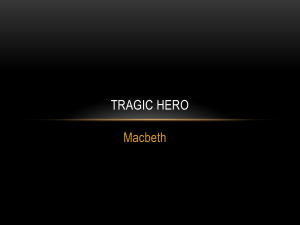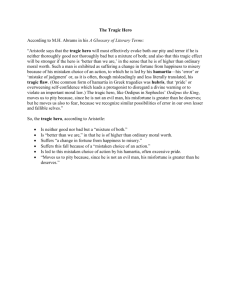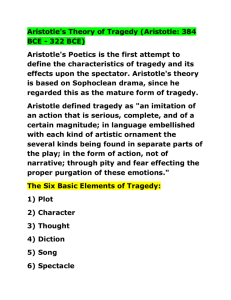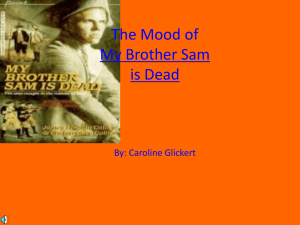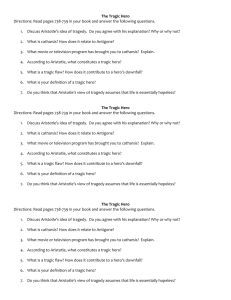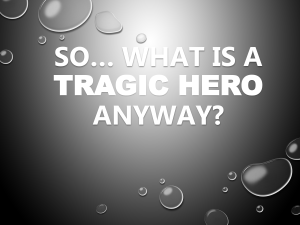Thomas_MillerTragedyDebate
advertisement
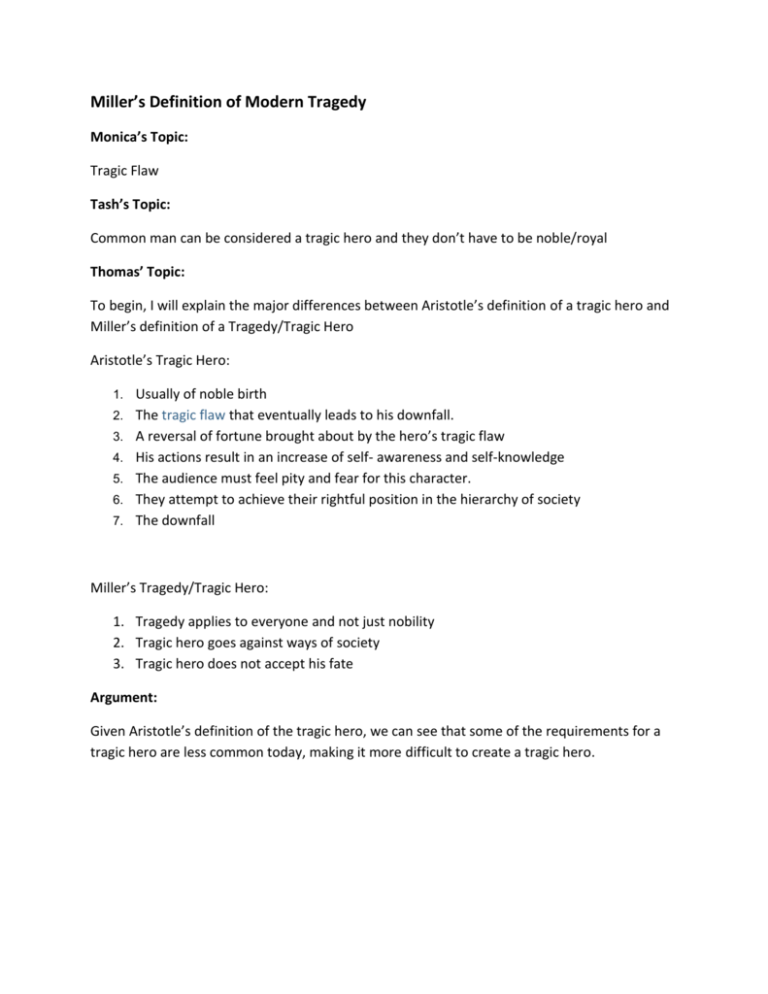
Miller’s Definition of Modern Tragedy Monica’s Topic: Tragic Flaw Tash’s Topic: Common man can be considered a tragic hero and they don’t have to be noble/royal Thomas’ Topic: To begin, I will explain the major differences between Aristotle’s definition of a tragic hero and Miller’s definition of a Tragedy/Tragic Hero Aristotle’s Tragic Hero: 1. 2. 3. 4. 5. 6. 7. Usually of noble birth The tragic flaw that eventually leads to his downfall. A reversal of fortune brought about by the hero’s tragic flaw His actions result in an increase of self- awareness and self-knowledge The audience must feel pity and fear for this character. They attempt to achieve their rightful position in the hierarchy of society The downfall Miller’s Tragedy/Tragic Hero: 1. Tragedy applies to everyone and not just nobility 2. Tragic hero goes against ways of society 3. Tragic hero does not accept his fate Argument: Given Aristotle’s definition of the tragic hero, we can see that some of the requirements for a tragic hero are less common today, making it more difficult to create a tragic hero. Miller says that tragedy is meant to be a positive demonstration of human qualities that are present in society and not pessimistic as it is thought of often. Tragedies intend to show the tragic hero achieving, or attempting to achieve his humanity. This is appropriate towards modern society because we often see others going through long and vigorous processes to ultimately become the best person they can be Miller states that the possibility of victory has to be present in a tragedy. When the audience is over-sympathetic towards the protagonist (as Miller calls pathos), it means there is no possibility of victory, making it not a tragedy. Despite the lack of odds, there must be hope and possibility of perfectibility of a man. This is appropriate towards modern society because there is always a chance of winning or achieving the goal; the failure to achieve it is what makes it tragic. If there were no hope to begin with, the audience would not find it tragic when the protagonist actually fails. Miller states that the sense of ‘tragedy’ is lost when a character accepts his fate and “lays down his life”. This is because a tragic “hero” is thought of as a character that will fight until death to maintain personal dignity. This is appropriate towards modern society because in the stories we have read/seen, for the most part the character will do whatever they can to achieve their goal, survive or whatever the case is. I’m sure anyone can think of their own examples whether they are video game campaign stories, movies, books, or plays. Miller states in his essay, “Above all else, tragedy requires the finest appreciation by the writer of cause and effect.” and explains how the author must be completely willing to question everything. He continues on how the ability of a man to sit back and truly see himself for whom he is, is one of the main necessities. A perfect example of this is the movie, Shutter Island. The writer questions the ways of the institution and society throughout the movie, and at the end, Leo Dicaprio sees himself for who he is. This definition is fitting for modern age because there are institutions, habits, and customs that should be questioned. It’s also a very liable realization for a man to have before his death, downfall, or failure. Conclusion: Restating the points, tragedies intend for the audience to be optimistic towards the display of human qualities, which is an appropriate evaluation of how it should be in modern age because it allows the writer to show the realization of the quality, and how the character decides to fix it. This is a good way of writers showing morality. Secondly, the hope and possibility of victory has to be present in tragedies, because without it, it is not necessarily tragic when the character fails. Thirdly, the sense of tragedy is lost when the character admits to failure and gives up because a modern age hero is thought of to never give up and to fight until death. The author must also be able to question absolutely anything because many things that seem inevitable to us should be questioned. Lastly, the action of a man realizing himself is a necessity because it allows the audience to pick out the flaws and morally learn from them. It also makes for a noble and tragic death or downfall.

